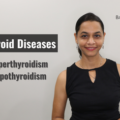
The thyroid is a butterfly-shaped gland. It is located in the lower front of the neck. The main job of the gland is to make thyroid hormones. These hormones are released into the bloodstream & carried to every tissue which controls the speed of the metabolism.
Hypothyroidism is when the thyroid gland doesn’t produce enough thyroid hormones and metabolism slows down. The symptoms of hypothyroidism are a slow heartbeat, depression, dry skin & hair, muscle
cramps, and gain in weight. Causes of primary hypothyroidism include iodine deficiency, surgery, radiation therapy, thyroiditis, and medications.
Hyperthyroidism is when the thyroid gland makes too many thyroid hormones, speeding up metabolism. Symptoms are increased heartbeat, anxiety, frequent bowel movements, difficulty in sleeping, irregular periods, and weight loss. You may not show all the symptoms but it comes slowly or suddenly over time. The common causes are Grave’s disease, Goiter, and Thyroiditis. In this, the thyroid gland does not respond to the signals of TSH & continues to make too many thyroid hormones. Usually, thyroid glands make T4 & small amounts of T3. T4 gets changed to T3 in some places in the body.
Medication is necessary to treat this condition but it can be managed effectively through lifestyle changes and eating the right foods. There is no particular diet that helps in improving Thyroid gland functions but there are basic nutrients that are required for the thyroid hormone to function properly, and they are as follows…
Food to Have to improve Hypothyroidism:
Iodine
An essential mineral required to make thyroid hormones, and a deficiency can lead to hypothyroidism. Inadequate iodine intake is the most common cause of iodine deficiency. Iodine is abundantly found in dark leafy veggies, legumes, milk, curd, fish, seafood, eggs, chicken, and salt. In developed countries, this issue is eliminated because the government has also taken the initiative to iodize the salt so that iodine is available to the remotest places. Eating a balanced diet adds extra iodine.
Selenium
Another mineral necessary for thyroid health and thyroid hormone production is selenium. It also helps protect the damage caused by oxidative stress to the thyroid gland. Supplementation of selenium is not necessary for all the people with Thyroid as it found in nuts especially brazil nuts, sunflower seeds, milk, yogurt, chicken, lean meats, fish & eggs. According to research supplementing with 200 micrograms (mcg) of selenium per day has been shown to decrease thyroid antibodies.
Zinc
Is needed for thyroid hormone production and thyroid function. Zinc is found in foods such as almonds, walnuts, cashew nuts, pumpkin seeds, flax seeds and red meat.
Whole Grains
High in fiber diet helps lower the risk of constipation, which is a common symptom of hypothyroidism. Try incorporating whole grains such as oats, brown rice, broken wheat, quinoa, whole millets, etc. in the diet.
Food to Avoid in Hypothyroidism:
Goitrogens
Are substances found in foods that compete with iodine for absorption. If the intake of goitrogens is very high, the body cannot absorb enough iodine
- Cruciferous Vegetables –
Broccoli, Cauliflower, Kale. They contain glucosinolates which convert to Thyroxines which again compete with iodine absorption. Goitrogens denature with heat. Consuming these vegetables in cooked or steamed form should not be a concern. Avoid consuming it in raw form.
- Soya –
It has phytoestrogens called isoflavones which do not allow thyroid glands to function
adequately. Only in case of iodine deficiency consuming foods rich in iodine, and having
soya in moderation should not be a cause for concern.
Pearl Millet
This millet has E-Glycociflavons which do not allow iodine to be absorbed by the body. Consume this grain in moderation.
Gluten
Wheat, Barley, and Rye can cause thyroid issues in some individuals. Having gluten-free products like quinoa or millet does help in managing Thyroid hormone levels.
Processed Foods
Fast Foods or Junk Foods, Bacon, Sausages, etc contain high sodium amount, unhealthy fats, and sugar that affect overall health
Sugary Products
Extra sugar intake may lead to health issues like weight gain, inflammation which can aggravate hypothyroid symptoms.
Alcohol
It can interfere with Thyroid hormone synthesis and its functions. It doesn’t have a direct connection. Too much drinking affects liver cells.
Caffeinated Beverages
Moderate intake is fine
Common Guidelines:
- It is important to take thyroid supplements on an empty stomach so that the body can absorb them fully.
- Don’t take thyroid hormone at the same time as calcium supplements, iron supplements, antacids, acid reducers
- Both the minerals Vit D and Calcium can interfere with the absorption of your thyroid hormone medicine. While foods containing iron and calcium are safe to eat, avoid them in supplement form.
Conclusion:
Diet plays an important role in managing hypothyroidism than just medication. By incorporating these dietary tips and making mindful food choices, you can support your thyroid health and overall well-being.
Remember, it’s never too late to adopt healthy habits and make positive changes.
If you want to get started on your wellness journey please feel free to reach out by filling out the contact form on our website. We look forward to assist you on your wellness journey to better health and sustainable lifestyle.
Follow us on: Instagram, Facebook, Youtube and Stay Tuned for more such insightful & informational blogs & videos along with some delicious & healthy recipes.



